Tackling the Pamirs

|
Lat:
37:39.820000
Long:
76:10.383000
Tackling the Pamirs
27th August 2007
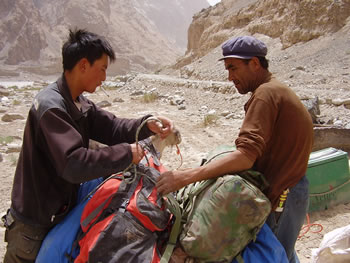 With a click of a button I’m amazed that I can email now from the
Pamirs. The technology is nothing new, but the ability to do so from this
location was a long lost fantasy to previous Silk Road caravans in
china. With a click of a button I’m amazed that I can email now from the
Pamirs. The technology is nothing new, but the ability to do so from this
location was a long lost fantasy to previous Silk Road caravans in
china.
Ten days gripped me like a vice in Kashgar clinching me in a state of final frenzy as I rushed to ensure all bricks were in place and all holes covered. At the fore of my mind was the need for good bags, new camel equipment, filming and finances. Time is never enough, need is always greater.
Perhaps the most interesting aspect of this brief respite was acquiring North Face bags from Beijing. I’d heard about a lot about the North Face Base camp bags, seen them in Kashgar coming off Pamiri expeditions and know they were right for the coming ride. Bombproof, waterproof, dust proof and camel proof, yet highly expensive and only available in Beijing. Getting hold of three required navigating China’s financial system and a lot of circular conversations in Chinese getting nowhere fast.
On the 16th July, gears shifted and the final pieces of the puzzle clunked into place. Camels were never meant for truck travel and in true caravan fashion it was infinitely more sensible to walk them down from Karakul. The distance to the start of the journey was 100kms, the town Taxkorgan and the man Zaire; the same Kyrgyz who’d looked after the camels for the past month.
An Open Question
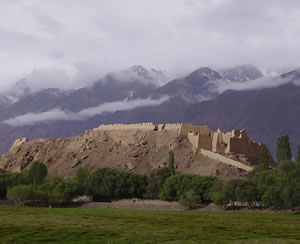 Taxkorgan greeted me like an open question open to suggestion and a hundred possible answers. It took three days to walk the camels down the main road to the Tajik town and another two for me to arrive. Daily updates accompanied their progress but I don’t think I was ever prepared to find the camels stabled in a school.
With my belongings stationed in Karakul, it was an extremely packed car of tack, rucksacks and animal fodder that pulled up to an old dilapidated school on the outskirts of town. The former center of learning was but a shell of its former glory and today used as a colony for local families, three camels and a horse. After unloading, the car rushed off to face a fine for not possessing a tourist license and I had a closer look at my former camels. (Note that I was accompanied on this journey by Memet Bhacti, who’d been asked by KMA to originally accompany me on this journey back in May. The offer had been rejected at the time due to his father’s ill health, but his brother had been the one to escort Alexandra Tolstoy across Xinjiang to Xian - and narrated in her book, ‘Last Secrets of the Silk Road’).
Lumbering forwards two of the beasts thrust their snouts through the barricaded entrance of a former classroom as I greeted them. Their blankets had been dumped in a ragged heap on the ground, and two of my formerly shaggy beasts had somehow molted their entire winter coat in the ten days we’d been separated. Boran was tethered in the classroom cum stable next door looking forlorn but healthy.
All the animals had been stabled with Memet Imim, a Kyrgyz family relation of Zaire’s whose family home was in the classroom opposite to the camels. Memet was a large man in his late forties I’d met several times before at Karakul Lake. His slow movements and slightly dimwitted approach to life made him great around the prickly Boran and true to this word he faithfully looked after my suppository of belongings while we were in Taxkorgan. But the man was wily in business and when it came to the cost of room rent, learning truth from local fiction was a skill I quickly had to acquire.
From the day I arrived in town my primary concerns were finding grass fodder for the animals countering Memet Imim’s attempts to secure more money for the animals and replacing broken camel equipment. The camels had wisely chosen to eat the one saddle that had been left dumped in their enclosure and another run to Kashgar was needed to buy another one. Finding a new cameraman and dealing with a hospitalized drunken camel driver rounded off the six days in town but it was the enraged owner of the school that eventually bade us farewell.
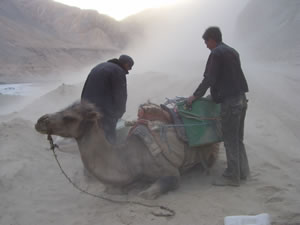 Ranting and raging over the injustice of camels in his complex, the Tajik man created a storm in a teacup while a vet was examining our small camel for problems. The animal wasn’t touching his food and had a series of strange marks around his snout. Calling the vet was a last minute precaution to later problems. The Tajik owner has two issues. One, being that the wily Memet Imim hadn’t paid him a cent of the money I’d given him for the animal’s ‘room.’ Two, he wasn’t happy about three smelly camels living in his school and basically wanted us to leave straight away. However, the man wouldn’t see reason. The animals had lived in the school for eight days and one more night would hardly make a difference. The issue of money was between him and Memet Imim and in the end a policeman had to be called to mediate the issue.
Thus on Friday, 27th July 2007, we set off for good. Everything from fate, God and Taxkorgan combined had thrust us out on the open road. There was no looking back. It took over four hours to pack, film and persuade the horse to leave his sanctuary and at 0930am we were off. Beijing beckoned and our first day was underway. It was the start of a beautiful day.
Taxkorgan Fort passed slowly on our right as we headed 35kms to our first night’s stop at Xindie. Since time memorial Taxkorgan has been a Silk Road stopover and the fort is a relic of a previous time. ‘tax’ (Tash) literally translates as ’stone’ in the local Uighur and Tajik languages and rumour has it that a stone tower near Taxkorgan once provided a much needed navigation point for Silk Road caravans heading East across the Taklamakan desert, West into Central Asia or South into India.
The First Day
Everything was in a mess and just as we were righting fate’s undoing, a cry and a shout rent the air. Screaming and bellowing for all his worth a local man came stumbling over a nearby rise. His hat was askew, coat in tatters and eyes bloodshot. I’d no time for the local drunk. Yet this one stormed over grabbing the ropes of a nearby camel and dragging it over the road. Apparently we were on his property and he wanted us off. He couldn’t see we were in a temporary pickle and as the camel he was dragging screamed in pain I grabbed the imbecile and marched him from the scene. I was furious, but drunks act on impulse not on thought and fortunately the man acquiesced when we’d moved everything off his land.
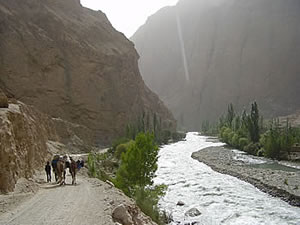 The delay had cost us an hour and we still had 30 kms left to march. After a short push along the main road to Kashgar our road branched off to the left and civilisation became an afterthought in a sudden world of villages, stone and wilderness. Crags ruled, rocks dominated and life hid in the crevasses. The Silk Road was never easy and this first day certainly wasn’t to be. The muddy waters of the Taxkorgan River swirled to our right and we made good time on a recently tarmaced road, straight into the maw of China’s industrial might.
The Chinese are investing incredible sums of money in this region as their economy expands and needs grow. Raw material consumption is exponential at present and the Pamirs are the perfect source. Rich in minerals, metals and water?we were about to enter the thick of it. In an almost abrupt transition we traveled from nothingness into a hive of activity. Bulldozers and diggers were as common above the road as the dump trucks ploughing down it. Huge industrial scale tunnels created a warren in the hillside above and it was only through God抯 grace that we noticed the frantic waving from above.
Once again, China reminded us that nowhere within her territory was without upheaval as from the heights above an explosion ricocheted through the gorge. A storm of debris pounded the surrounding area and the camels decided enough was enough. The head camel tired from a heavy load and unconditioning, knealt down and tried to roll. Dust clouds billowed around and pent-up traffic blasted their way past. Hell had erupted in a matter of seconds but nothing would stop the camels.
As one camel lay down, the others had to follow and we all became ghosts in the flesh, yanking, yelling, heaving and intimidating the reluctant beasts back to their feet. Xindie was but a stone’s throw away, yet though we’d left early it was already 9pm. Without knowing what to expect predicting everything is impossible and as I learnt in Pakistan you sometimes just have to deal with problems one thing at time.
A blanket of darkness welcomed us into Xindie, broken only by a single light. Aside from the road workers tents at the start of the village, the area was strangely silent and hardly the hundreds of people I’d been told lived here. Our cameraman directed us to a local Tajik camping ground two kilometers out of the village and we spent an eerie night amongst the recent ruins of former residences. Daylight brought no new clues to the absence of life here and it wasn’t until several days later that I learnt the terrible truth. A freak storm had unleashed cataclysmic mud slides on the village destroying the community who have since been relocated to Taxkorgan. (I suspect moved by an anxious local government keen to avoid another disaster).
Our first day on the road had been hard and unpredictable. Though we arrived in the dark, even the horse offered little protest as he was unsaddled. Organising four strange animals, camping by torch light and cooking for five people on an untested petrol stove made our first day a hard reality pill to swallow. And yet once done, lesson learnt. Though the next few days weren’t easy none was as tough as that first one. I’d passed my own mental exam and morning put everything in perspective.
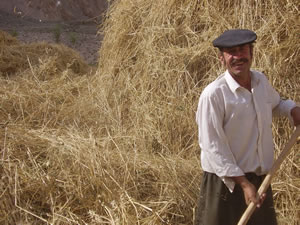 Throughout the next day we picked our way through a tapestry of nature’s gorges winding one way and the next with the adjoining river. We cleared China’s industrial backyard after a few hours and before long pockets of greenery broke through the barrenness around. Small squat homes of mud and brick began to dot the roadside, wasteland turned to lush green fields and cows mooed in the field. Nature’s cell had finally been broken and a new world beckoned.
The road disintegrated into a rock strewn mess better suited to a river bed than a key local artery. In a region upturned by armies and politics we were now in the heartland of China抯 Tajiks. A traditional people to whom respect is highly valued and with the time that village life brings to invest in friendships and each other. We were now truly on the other Pamir Highway connecting Taxkorgan to Yarkand and a route little changed in a thousand years.
Here TV and telephones are a broken dream. Women don traditional head-dresses and men peaked baseball caps. Villages are typically constructed of mud and stone dwellings akin to adobe when plastered. Along the road connecting village to village, donkey transport is as common as 4×4s. Jobs are a rarity here. Most people make a living off the land or selling Jade or precious stones from the surrounding hills. Education is still difficult for most children as schools are few and far between. As far as I can tell few in the region offer instruction in Chinese, thus few graduates are able to contribute to China’s economy and earn a high wage in a private of Government job. Boys are often given preference over girls to attend the better schools with Chinese classes. The Tajik language is never taught.
Still, people here are industrious; for every village we passed through has been beautifully landscaped with poplar lined roadsides and neatly walled fields. Most remarkable is that almost every nook, cranny and boulder by the road has been built around them to create pens for chickens or enclosures for livestock. Land is at a premium in the mountains sand every scrap of arable land had been tilled. Finding grass for the animals has been one of the main problems we’ve faced so far.
At the end of our second day, we entered Bilda village, an explosion of greenery after a desert of brown. We were greeted by a friendly family distantly related to our cameraman. Whiles I still had business back in Taxkorgan, the caravan spent five days at Bilda. As in Taxkorgan I was surprised at Bilda to find grass so scare in an area so plentiful. Locals would not allow us to graze our animals but they were eager to sell us bagfuls of fodder at a hefty price. It’s a point that vexes me still.
However, the further into the mountains we’ve travelled, the friendlier the people have become. Grass has become more forthcoming (often for free) and calls to tea or pulao rice echo from doorways in the villages we stay. We’ve passed through a staggering patchwork of vaulted gorges and precipitous cliffs created through an eon of erosion. The caravan has responded well to the road and life with the camels is a slow one.
On the Road
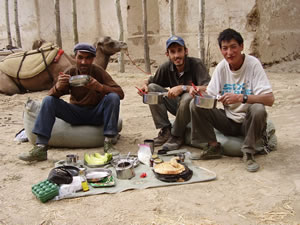 Since Bilda, we’ve spent four days on the road and five days off it. It’s now two weeks since we left Taxkorgan. Each day has been a fresh learning curve as new equipment is tested and things repacked for better storage and easier access. Each night we’ve camped opposite the camels after a battle with the river to pitch tents amongst the stones alongside.
Camels travel slowly at around four kilometres per hour and we make around 30 kms per day (around 160 kms completed). Food whilst travelling has been mainly noodles and naan bread and grass for the camels bought locally. Camels will eat anything from grass to cardboard and have an insatiable appetite. One of their favourite foods is bizarrely thistles (known as ‘Khu Ha’ locally) and half an hour amongst nature’s weeds is enough to give a camel a bellyful. A camel generally thinks for itself more than a horse and if fed-up, tired or hungry will simply kneel without warning or lunge across the road for the nearest greenery.
Boran has been an episode in his own right and each day is a new goal reached. A week ago I was able to put on his saddle without help and a few days ago it was his bridle. Trust is slowly developing between us, and like all friendships time is needed to water it further. Camels are less complicated than horses but our three have their own idiosyncrasies that I’ve only just beginning to understand.
Regarding the crew?despite his drunken misdemeanour some weeks ago, Rosa Khun has developed into a great camel driver diligent in his duties, knowledgeable and with a ready cackle. Communicating is getting easier as my Uighur improves and the man seems content with a bellyful at night and a road to walk on the next day. He doesn’t ride horses! Korban on the other hand can be churlish and conveniently absent minded when he wants but he does as asked and seems to keep a level head in a crisis. I expect he抣l be with us for another week.
Off the Road
After three days on the road I was glad when we eventually pulled into the tiny oasis of Lenga, a small island of forest on a low plateau over the Yarkand River. The camels needed resting, horseshoes needed checking and I had a whole gamut of chores to complete from darning socks to washing clothes, to repairing equipment and repacking. Despite a run-in with the local police (who ironically translated from Chinese to Uighur for me when they found I knew a little), our brief stopover was also the occasion to treat two of the camels.
For days, two of the animals had been attracting an extraordinary number of flies and it turned out their nose-pegs were infected. Camels in Xinjiang (NW China) are controlled by a single wooden peg driven through the upper ligaments of their nose while they抮e still young. A length of rope is attached to this, which is used to keep the camel in check and in line with the caravan. On the move, the rope of each camel is tied loosely to the pack saddle of the animal in front and the caravan ticks forward as one.
However, one of the nose pegs had almost come loose and another sat over a gaping wound unhealed from a previous time ?and left untreated would become home to maggots and any number of untold nasties. One at a time, each camel was made to kneel and a length of rope wrapped around its left knee, passed over its neck and around its right knee, thus preventing the beast from rising. Its head was then carefully positioned next to a nearby tree and the nose pegs were readjusted and wounds disinfected and treated. We are currently using a new tea-tree based ointment called White Healer from Ranvet in Australia.
It’s been five days now since ’surgery’ and both camels have improved. In this heat, keeping flies away is impossible but I expect the wounds to heal quickly. From hereon, the gorges get tighter and we face possible problems with flooding on the Yarkand River as we head towards the Tibet border and into the Kunlun Mountains. The next major Silk Road center is at Hotan about 500kms from our present position, where silk weaving and jade trading are still a major part of local life. Our caravan plods on. Slow going equals a slow life and problems come and go on the wind that carries them. Until next time. |